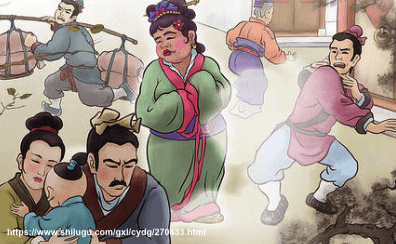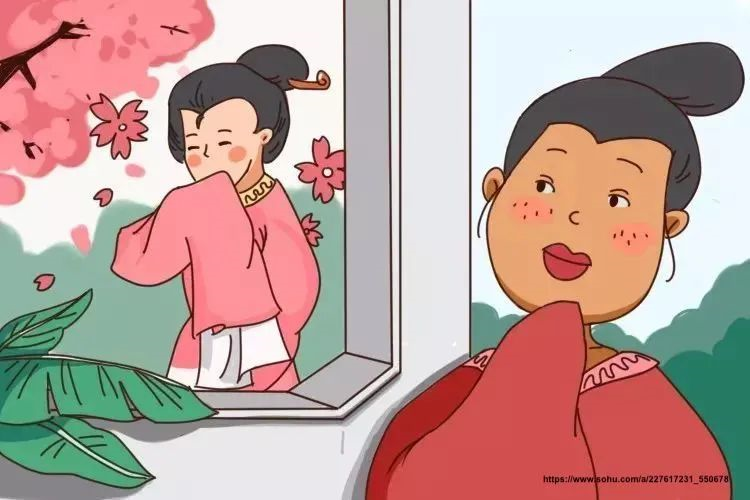Chinese Idiom Explained: 东施效颦
August 18, 2022
The popular "东施效颦" (dōng shī xiào pín) can be roughly translated as "putting up a front" in English.
In this blog, we will share with you both the Chinese and the English versions of the story behind idiom “东施效颦" (dōng shī xiào pín), what it means, as well as how to use it in a sentence.
Let’s dive in!

西施是中国古代的美女,她长得美极了!走在路上,无论男女老少,都会停下来欣赏她的美貌;她在河边洗衣服,水里的鱼被她吸引住了,竟然忘了游泳!不管西施穿什么衣服、做什么动作,人们都觉得特别美.
有一次西施病了,她用手捂住胸口,皱着眉头,虽然她看上去很不舒服,但是见到她的人都称赞说:“西施这个样子比平时更可爱啊!”
Xi Shi was one of the Four Beauties of Ancient China. She was gorgeous!
As she walked the streets, men and women of all ages always stopped in their tracks and admired her beauty. As she washed her clothes in the river, even the fish were struck by her beauty and lost their way. Whatever Xi Shi wore, whatever Xi Shi did, people always thought it was beautiful and graceful.
One time, Xi Shi fell ill. She was clutching her chest and frowning in pain. Even though she looked uncomfortable, people still praised her, saying: ‘Xi Shi looks cuter than ever!’
村里还有一个叫东施的姑娘,她长得并不好看,而且有点儿丑,但她特别羡慕西施的美,所以常常穿着和西施一样的衣服,学着西施的样子走在路上。可是却没有一个人说她漂亮!
东施突然想起来,人们都说西施生病的样子更美,于是她也用手捂住胸口,皱着眉头,做出很难受的样子,在路上走来走去。
没想到,见到东施的人都远远地躲开了她,还有人马上回家把大门关得紧紧的!
In the village, there was another young lady called Dong Shi. She wasn’t that pretty; in fact, she was a little ugly. But she really admired Xi Shi’s beauty, so she often wore similar outfits and imitated how she walked. But not one person said she was beautiful!
Dong Shi suddenly had an idea. Everyone said that Xi Shi was beautiful when she was ill, so she too clutched her chest, frowned in pain, acted as if she was sick, and began to walk around the village.
Well, those who saw Dong Shi instantly hid in fear. Some even rushed home and locked the doors behind them!

这个故事告诉我们,不要盲目地模仿别人,应该根据自身的特点,扬长避短,找到适合自己的目标。
This idiom tells us that we can’t blindly copy others. We have to build from our own unique characteristics, foster our strengths and work on our weaknesses. We should aim to reach goals that suit us.
东施 dōng shī (name of a character)

效 xiào (to imitate, to copy)

颦 pín 颦眉 pín méi(to furrow your eyebrows)


“东施效颦” 字面意思就是东施模仿(西施)皱眉的样子,比喻不看自己的具体情况,盲目地模仿,结果只会适得其反;有时也作自谦之词,表示自己基础差,学别人的长处没有学好。
At first glance, this idiom means Dong Shi is imitating (Xi Shi’s) frowned eyebrows. But it is a metaphor for those who don’t consider their own situation and blindly copy others. The result will be the opposite of what they hoped.
Sometimes this idiom is used to express modesty, like a self-effacing phrase. It expresses that you are aware that you don’t have the necessary skills and that copying others will not better yourself.

例句(EXAMPLE SENTENCES)
她不会打扮,再怎么学哪个明星,也只不过是东施效颦罢了。
Tā bù huì dǎbàn, zài zěnme xué nǎge míngxīng, yě zhǐ bùguò shì dōngshīxiàopín bàle.
She doesn’t know how to dress up. No matter how much she tries to learn from celebrities, she’s still putting up a front.
如果我们照搬西方的思想文化,不加分析,那无异于东施效颦。
Rúguǒ wǒmen zhàobān xīfāng de sīxiǎng wénhuà, bù jiā fēnxī, nà wú yì yú dōngshīxiàopín.
If we keep replicating Western ideologies and culture without properly considering it, it’s no different from when Dong Shi imitated frowning.
教授说我这本书的风格有点儿像某一本诺贝尔文学奖的作品,其实我不过是东施效颦罢了。(自谦)
Jiàoshòu shuō wǒ zhè běn shū de fēnggé yǒudiǎn er xiàng mǒu yī běn nuò bèi'ěr wénxué jiǎng de zuòpǐn, qíshí wǒ bùguò shì dōngshīxiàopín bàle. (Zì qiān)
My professor said that the style of my book is quite like a Nobel-winning piece of literature, but I think it’s more a blind imitation. (Modesty)

We have more Chinese Idioms in store for you!
About the Author
Qi Laoshi
Tianjin Normal University; Chinese language textbook editor and a doting mother.
